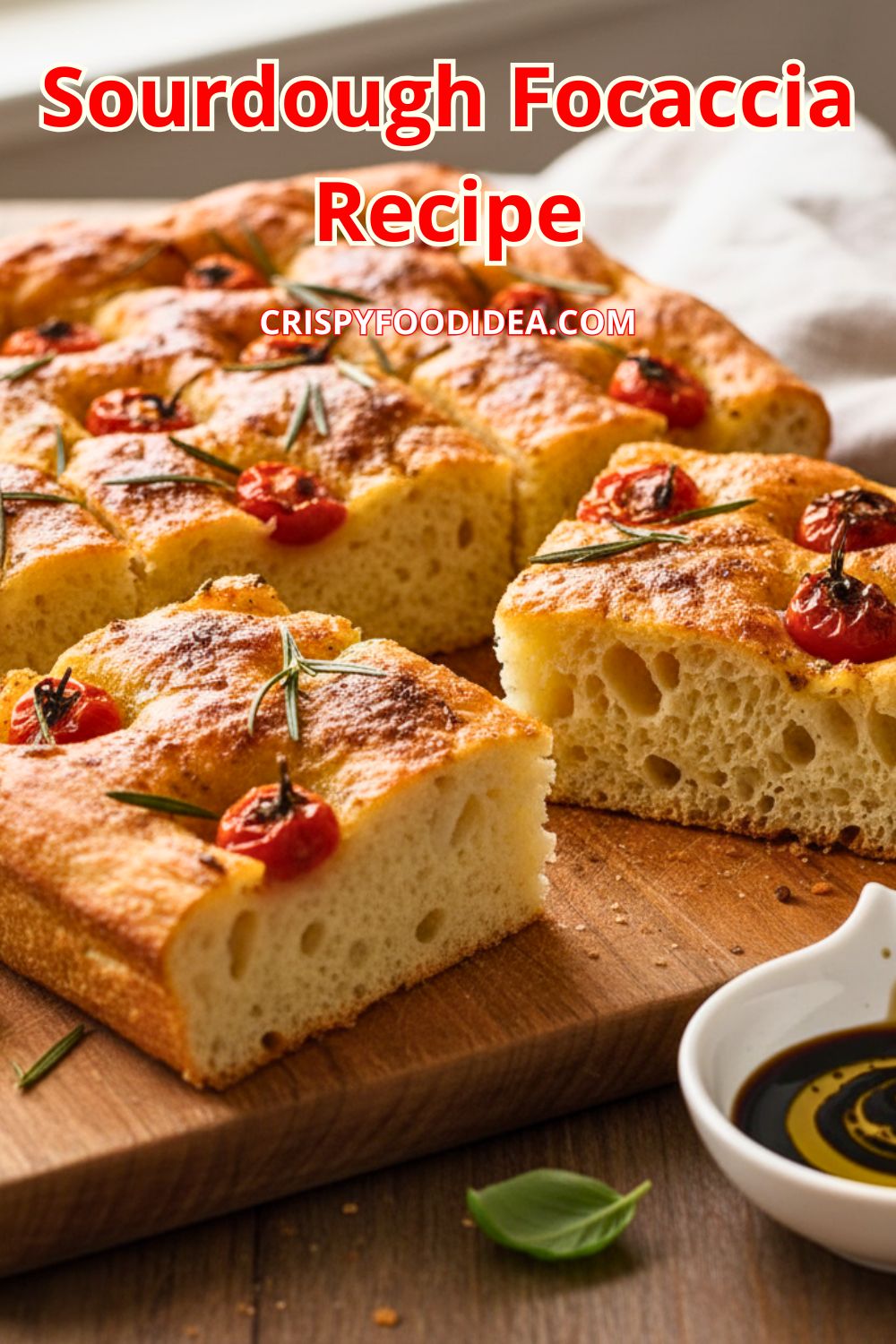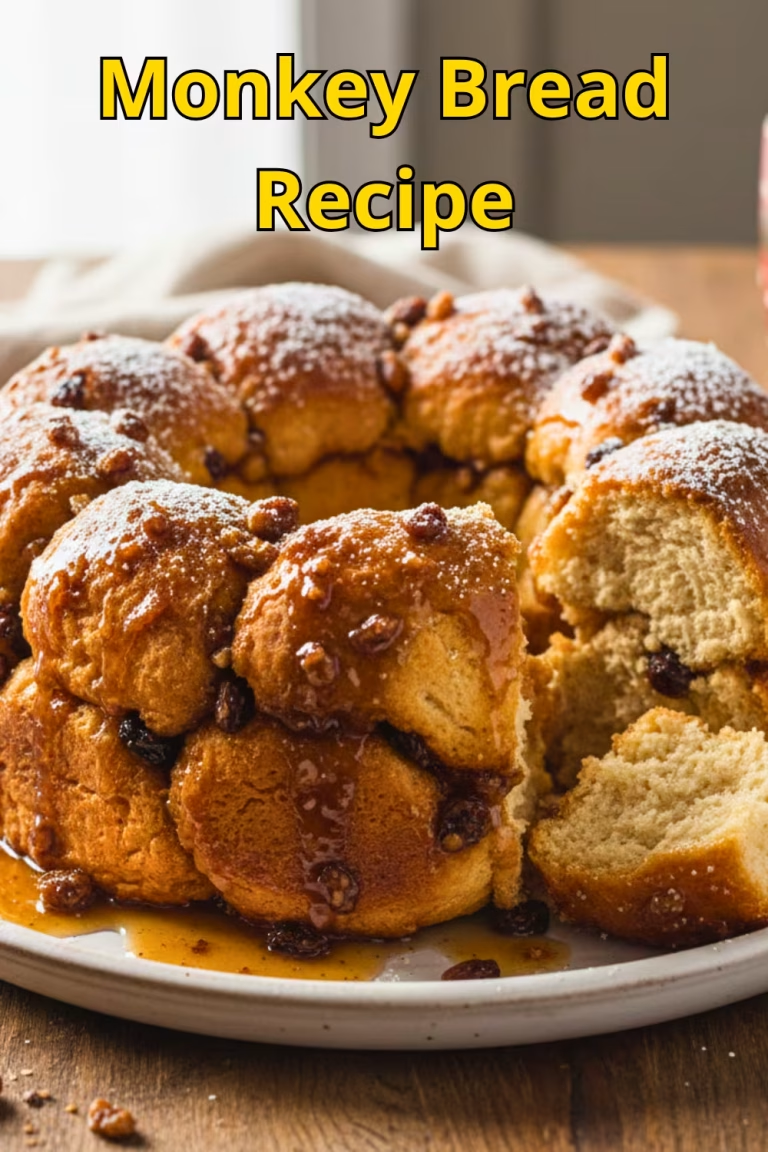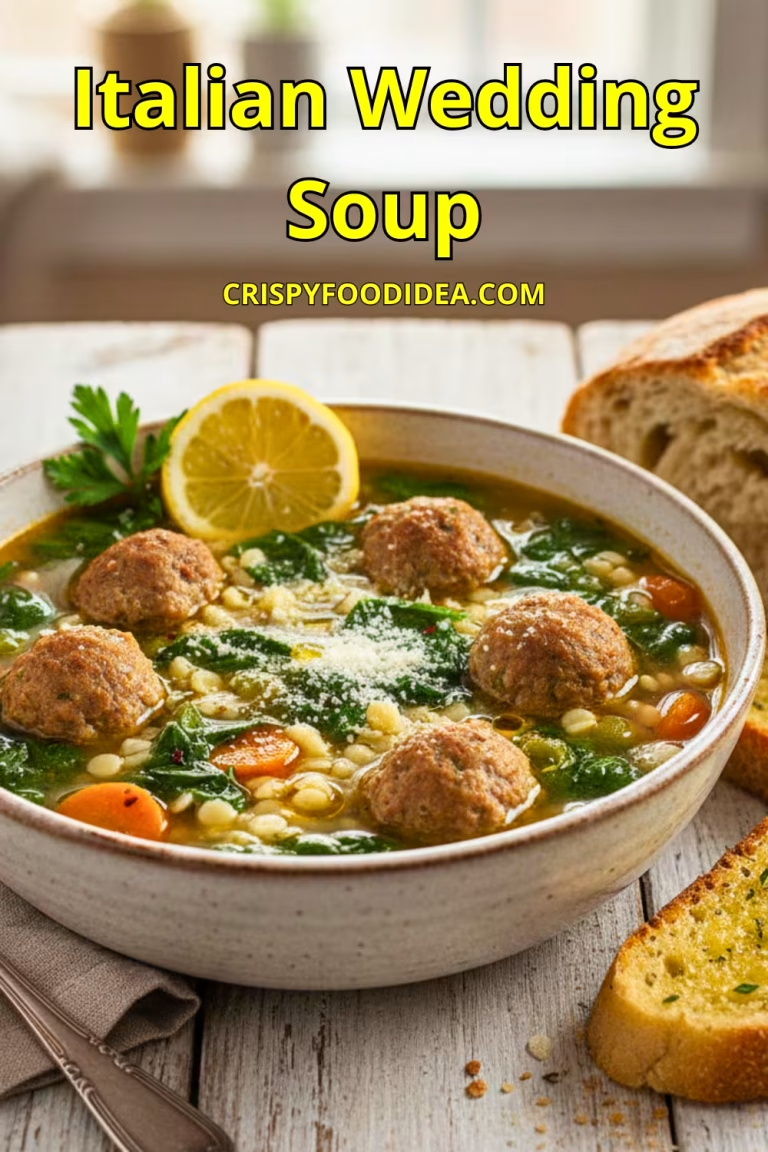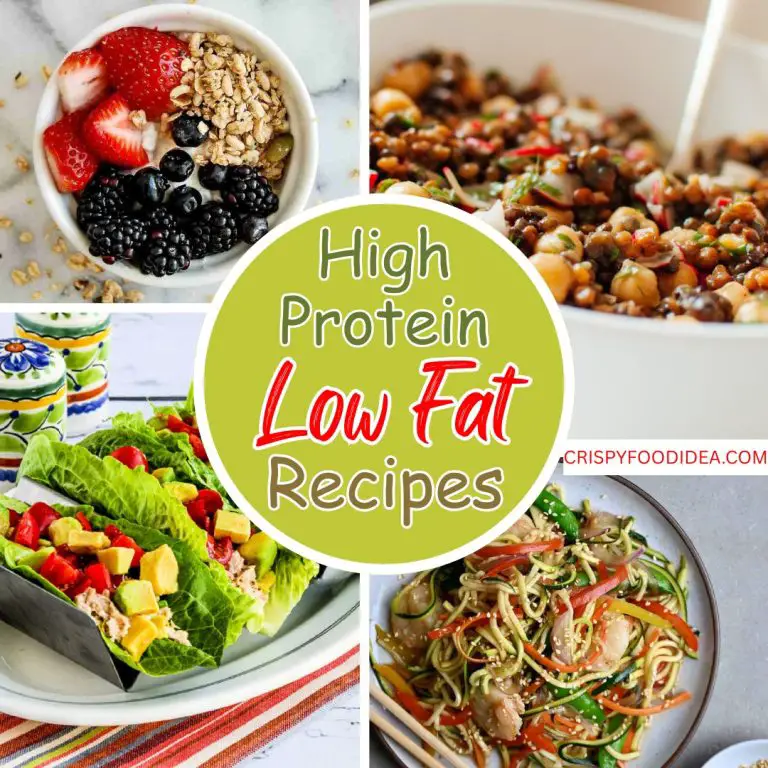The BEST Sourdough Focaccia Recipe (No-Knead, Overnight, Super Airy!)
Breakfast is the first thing that comes to our mind, naturally, and first of all, it is bread. Today, I am going to discuss with you one such amazing bread recipe, called the bakery-style sourdough focaccia recipe. It is crispy on the outside, soft and airy on the inside, and fragrant with rosemary, garlic, and extra-virgin olive oil. This is one of the easiest, most flavorful, and most beginner-friendly no-knead sourdough breads you can bake, thanks to a long, natural overnight fermentation that develops incredible flavor, texture, and gut-friendly benefits.
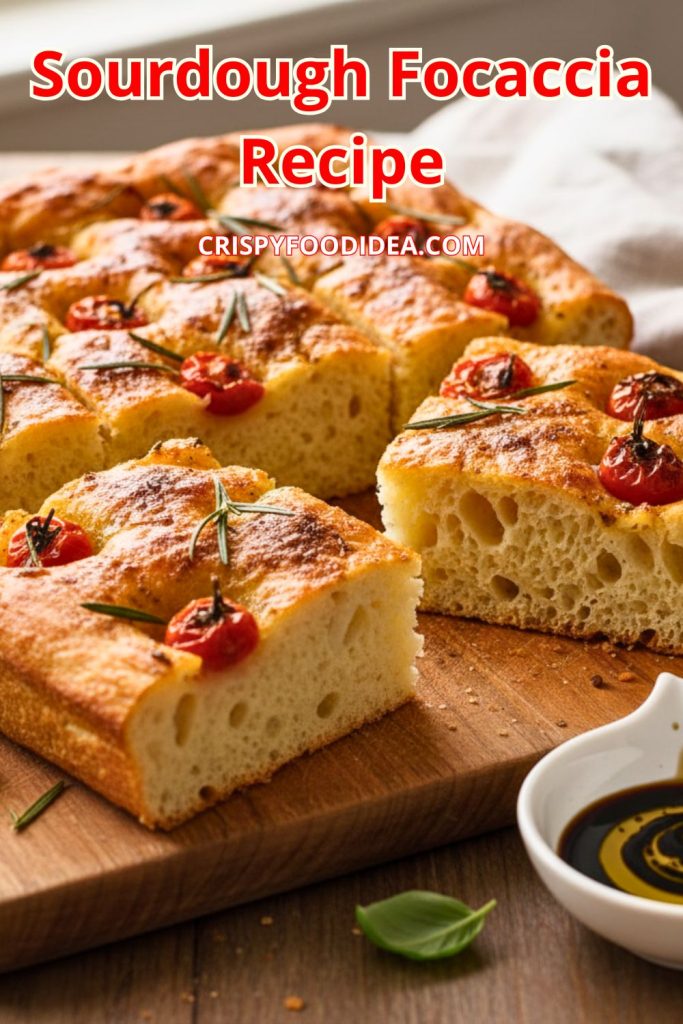
Unlike traditional yeasted focaccia, this recipe uses a 100% hydration active sourdough starter, which not only enhances digestibility but also gives that signature airy crumb, deep golden crust, and rich, tangy aroma artisan bakeries are known for. Those of you who occasionally make bread at home for breakfast can easily make this bread, and those who are completely new to it can also make this bread very easily, because it is a completely hassle-free recipe.
I have also given you expert-level baking tips for this authentic Italian sourdough focaccia here that will guarantee that your bread will be perfect. You can use this bread very beautifully for appetizers, sandwiches, and various other occasions at any small gathering organized at your home. Moreover, this best sourdough focaccia recipe that you will make is a naturally fermented dough, with rich olive oil flavor, and versatile toppings. Let’s dive in and create your new favorite artisan sourdough focaccia—effortless, flavorful, and guaranteed to impress!
Related: Shrini Danmarki Recipe
The Best Artisan Sourdough Focaccia – Easy, No-Knead, Overnight Rise
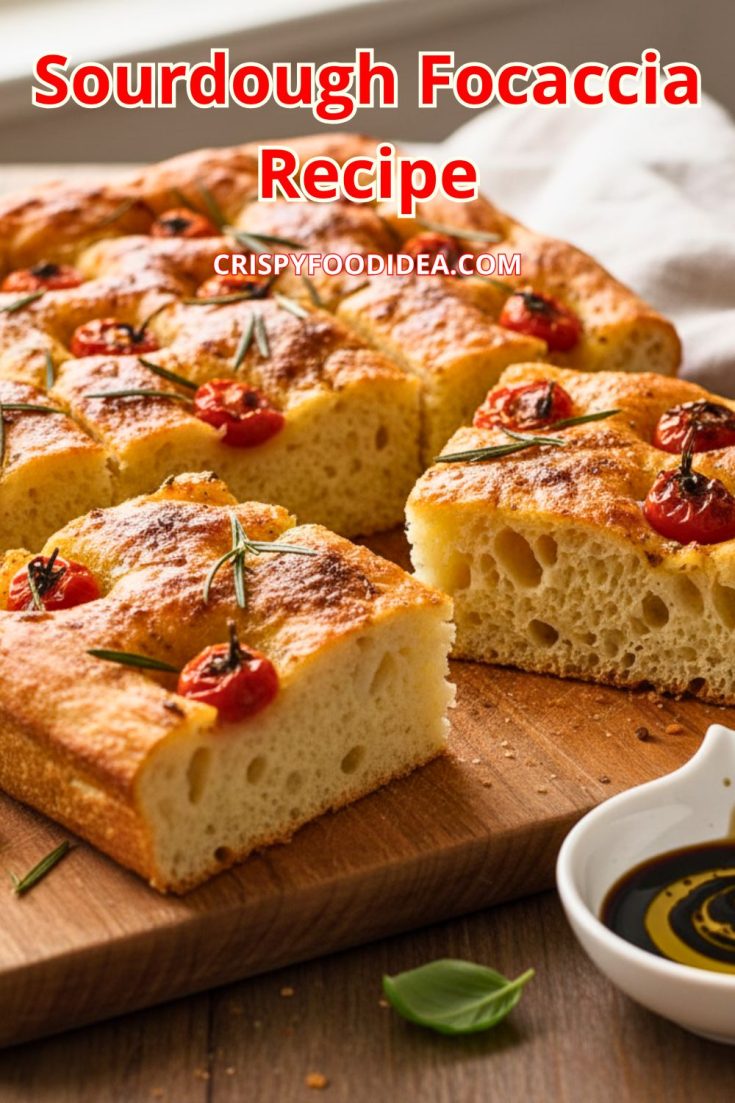
This Sourdough Focaccia Recipe is a no-knead, beginner-friendly, and ultra-fluffy Italian bread made with active sourdough starter, olive oil, and simple pantry ingredients. It’s naturally fermented for better gut health, improved digestibility, and incredible artisan bakery-style flavor. Perfect for sandwiches, appetizers, dipping, meal prep, or festive occasions, this homemade focaccia delivers a crispy golden crust with a soft, airy interior.
Ingredients
For the Sourdough Focaccia Dough
- 500g (4 cups) bread flour or all-purpose flour
- 100g active sourdough starter (100% hydration)
- 400g (1⅔ cups) lukewarm water
- 10g (1½ tsp) sea salt
- 20g (1½ tbsp) extra virgin olive oil
For the Pan
- 3–4 tbsp extra virgin olive oil (for coating & crisping)
Toppings (Choose Any)
- Fresh rosemary
- Garlic cloves (thinly sliced)
- Cherry tomatoes
- Caramelized onions
- Flaky salt
- Olives
- Sun-dried tomatoes
- Fresh thyme or basil
- Chili flakes
- Parmesan cheese (optional)
Instructions
Step 1: Make the Dough
- In a large mixing bowl, whisk together active sourdough starter and lukewarm water.
- Add flour and salt. Mix with a spatula until a shaggy dough forms.
- Drizzle 1 tbsp olive oil on top and cover the bowl with plastic wrap or a damp towel.
Step 2: Bulk Fermentation (Overnight)
- Let the dough rest at room temperature for 12–18 hours or until doubled and bubbly.
- If your kitchen is warm, bulk fermentation may finish in 8–10 hours.
Step 3: Prepare the Baking Pan
- Oil a 9×13-inch baking tray generously (3–4 tbsp).
- Transfer the fermented dough to the tray.
- Stretch gently to fit the pan without deflating too much.
Step 4: Second Rise (Proofing)
- Cover the tray and let the dough proof for 2–3 hours until puffy.
Step 5: Dimple & Add Toppings
- Drizzle 2 tbsp olive oil over the dough.
- Use your fingertips to press deep dimples across the surface.
- Scatter rosemary, tomatoes, garlic, olives, flaky salt, etc.
Step 6: Bake
- Preheat oven to 220°C / 430°F.
- Bake for 22–25 minutes, or until golden brown with a crispy crust.
- Cool on a wire rack before slicing.
Notes
- Use filtered water to avoid harming natural fermentation.
- Keep dough hydrated—wet dough = airy focaccia.
- Allow full fermentation for natural sourdough health benefits.
- For bakery-style flavor, cold ferment the dough for 24 hours.
- Add toppings right before baking to prevent sinking.
Serving Suggestions
- Serve with olive oil + balsamic vinegar dip
- Make sandwiches (caprese, turkey pesto, mozzarella)
- Pair with soups, salads, and pasta dishes
- Use as a base for mini focaccia pizzas
- Serve as a holiday appetizer
Nutrition Information:
Yield:
12Serving Size:
1Amount Per Serving: Calories: 189Total Fat: 3gSaturated Fat: 1gUnsaturated Fat: 2gSodium: 368mgCarbohydrates: 36gFiber: 1gSugar: 0gProtein: 5g
Suggested: Shrimp and Grits Recipes
About This Sourdough Focaccia Recipe
If you love artisan-style bread, crave bold Mediterranean flavors, or want a perfect way to make beautifully airy, crunchy sourdough focaccia at home, this recipe is going to be your new favorite. That’s why this is truly the best sourdough focaccia recipe you’ll ever bake – perfectly optimized for beginners, home bakers, and seasoned sourdough lovers.
⭐ 1. No-Knead, Beginner-Friendly & Zero Skill Needed
This recipe uses a no-knead sourdough method, making it incredibly simple for anyone to prepare. The naturally high hydration and long fermentation do all the work, allowing you to create bakery-quality focaccia without any special tools, mixers, or kneading techniques.
⭐ 2. Crispy Golden Crust With an Ultra-Airy Crumb
Thanks to the slow overnight fermentation, olive oil hydration, and proper folding techniques, this sourdough focaccia develops a crisp, golden-brown crust while staying soft, fluffy, and airy inside. You get those signature large focaccia bubbles every artisan bread lover dreams of.
⭐ 3. Naturally Fermented for Better Flavor & Gut-Friendly Nutrition
Unlike commercial yeast recipes, this focaccia is made entirely with an active sourdough starter, giving it rich, complex flavor and natural tang. The long fermentation also improves digestibility, enhances nutrient absorption, and supports a gut-friendly, probiotic-rich bread experience.
⭐ 4. Flexible Rising Schedule (Overnight or All-Day)
You can bake early in the morning or prefer prepping at night, this recipe adapts to your schedule.
- Overnight sourdough rise for airy texture
- Room temperature bulk fermentation
- Cold fermentation option for deeper flavor
⭐ 5. Endless Topping Options
This focaccia is a blank canvas! Add classic rosemary & sea salt, juicy cherry tomatoes, olives, garlic, caramelized onions, herbs, or cheese—whatever suits your taste. It works for everything from holiday appetizers to weekend brunches, Italian dinners, and party snacks.
⭐ 6. Perfect for Sandwiches, Party Platters & Meal Prep
Because the crumb is soft yet structured, this sourdough focaccia slices beautifully for gourmet sandwiches, paninis, appetizer boards, and dipping. It stays fresh longer than yeasted focaccia thanks to natural fermentation, making it ideal for meal prep, picnics, and entertaining.
⭐ 7. Uses Simple, Pantry-Friendly Ingredients
No complicated ingredients, no additives—this recipe uses basic pantry staples: flour, water, salt, olive oil, and a sourdough starter. High-quality extra-virgin olive oil adds richness and keeps the flavor of the minimalist Italian bread traditional and authentic.
⭐ 8. Foolproof for All Seasons & All Ovens
This sourdough focaccia comes out beautifully every time. It’s extremely forgiving and works in both gas and convection ovens, making it beginner-proof and expert-approved.
⭐ 9. Restaurant-Level Results at Home
The flavor, texture, aroma, and appearance mimic what you’d find in a professional Italian bakery—but at a fraction of the cost. It’s one of the most rewarding and impressive sourdough recipes you can make.
Related: Banana Bread Recipe
What is Sourdough Focaccia?
Sourdough focaccia is an artisanal Italian flatbread made with a naturally fermented starter instead of just commercial yeast. Traditionally made with olive oil, flaky sea salt, and fresh herbs like rosemary, focaccia is prized for its golden, crispy crust and soft, open, airy crumb. This variety uses an active sourdough starter to create complex flavors, a longer shelf life, and improved digestibility through natural fermentation.
While focaccia has its roots in ancient Italian and Mediterranean baking traditions, modern sourdough focaccia combines those centuries-old techniques with contemporary starter culture to create an unparalleled depth of flavor: lightly sour, richly buttery, and wonderfully textured.
- 🍞Ancient roots: Focaccia is one of Italy’s oldest breads — a true Mediterranean flatbread.
- ⚖️Fermentation-forward: Using a sourdough starter (natural leaven) adds flavor, nutrition, and better texture.
- ✨Distinct texture: Characteristic dimples, glossy olive oil sheen, and big, irregular crumb pockets.
Suggested: Low-Carb Breakfast Burrito Recipes
Ingredients Explained — Sourdough Focaccia Recipe
Ingredients
- Active Sourdough Starter (100g) — Use a bubbly, recently-fed starter (100% hydration). The starter is the heart of sourdough focaccia: it provides wild yeast, lactic acidity, and a complex flavor profile that separates sourdough focaccia from commercial-yeast focaccia.
- Bread Flour or All-Purpose Flour (500g) — Bread flour (higher protein) builds better gluten structure for big, irregular holes and chew; all-purpose works if you prefer a slightly softer, more tender crumb. For whole-grain variations, substitute up to 20% with whole wheat or spelt for a nuttier flavor.
- Water (400g, lukewarm) — Hydration is key. This recipe targets a relatively high hydration (80% hydration by weight) to achieve the signature open crumb. Use filtered water to avoid chlorinated tap water hampering fermentation.
- Sea Salt (10g) — Salt enhances flavor and tightens gluten structure. Use fine sea salt or kosher salt; avoid iodized table salt if possible. Add salt after the initial autolyse to avoid weakening wild yeast activity.
- Extra Virgin Olive Oil (20g + for the pan) — Olive oil adds moisture, richness, and the classic golden, crispy bottom and edges. A high-quality extra virgin olive oil contributes aroma and an authentic Mediterranean flavor — ideal for search queries like “best olive oil for baking.”
Optional & Flavor-Building Ingredients
- Garlic or Garlic Confit — Roasted or thin-sliced garlic caramelizes beautifully during baking.
- Fresh Herbs (rosemary, thyme) — Classic focaccia herbs that pair with olive oil and flaky salt.
- Cherry Tomatoes / Olives / Caramelized Onions — Add for Mediterranean toppings and visual appeal; perfect for Pinterest and social shares.
- Cheese (Parmesan, Feta, Mozzarella) — For cheesy focaccia variations—use sparingly to avoid soggy pockets.
- “This sourdough focaccia uses an active sourdough starter and bread flour for an airy, open crumb that mimics artisan bakery-style focaccia.”
- “Using quality extra virgin olive oil and a wet, high-hydration dough creates a golden crust and soft interior — the hallmark of Italian focaccia.”
- “For the best flavor, cold ferment the dough 12–24 hours; this slow fermentation deepens sourdough tang and improves digestibility.”
Related: High Protein Smoothie Recipes
Sourdough Focaccia Recipe: Step-by-Step Instructions
Follow this no-knead sourdough focaccia guide for an artisan, airy crumb and a golden, crispy crust.
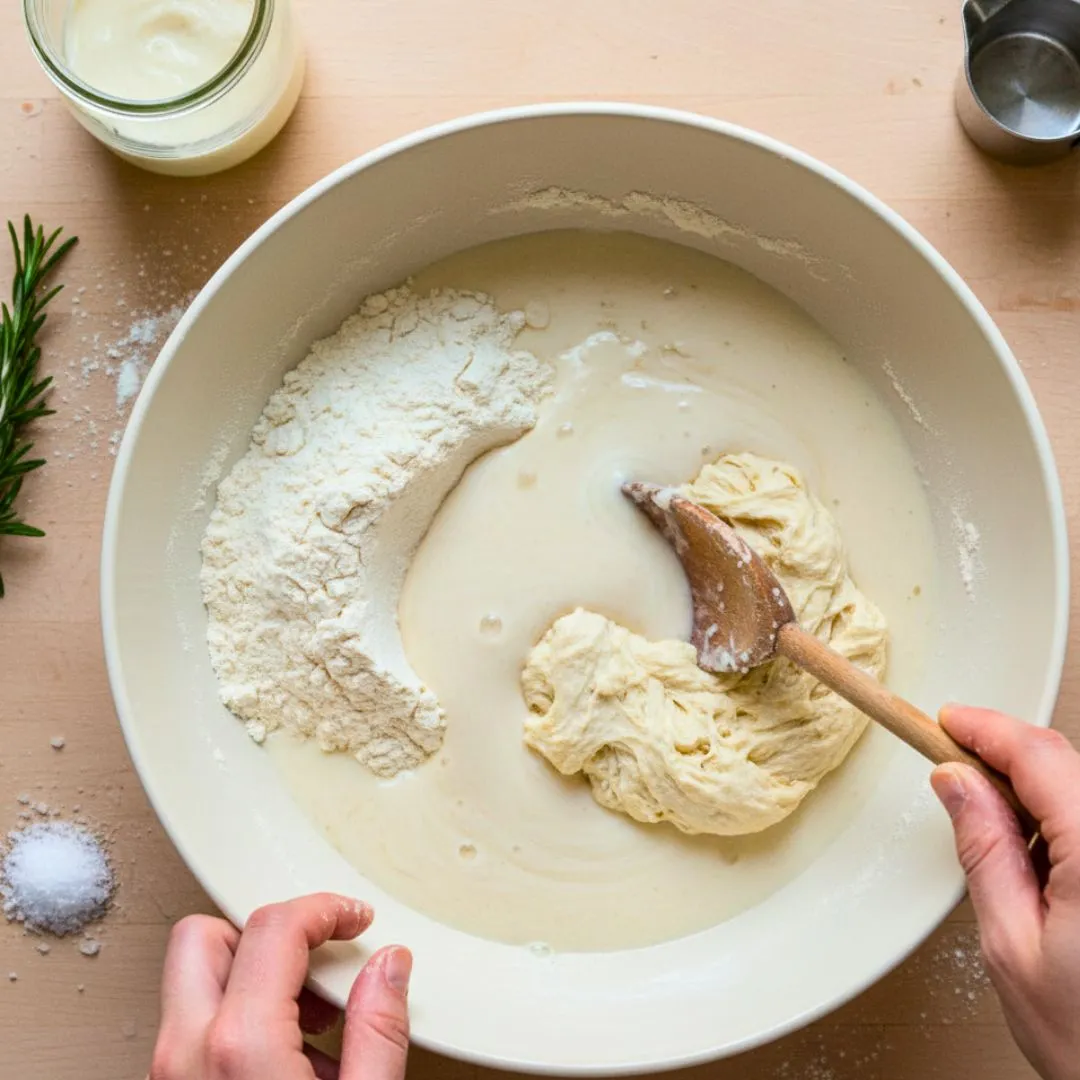
Mix the Dough (Sourdough + Hydration)
In a large bowl combine 100g active sourdough starter with 400g lukewarm water until blended. Add 500g bread flour (or AP flour) and 10g sea salt, and stir until a shaggy, wet dough forms. This high-hydration mix is essential for the open, airy crumb that defines an artisan sourdough focaccia.
Tip: A wetter dough → bigger holes later. Use a bench scraper to fold, not knead.
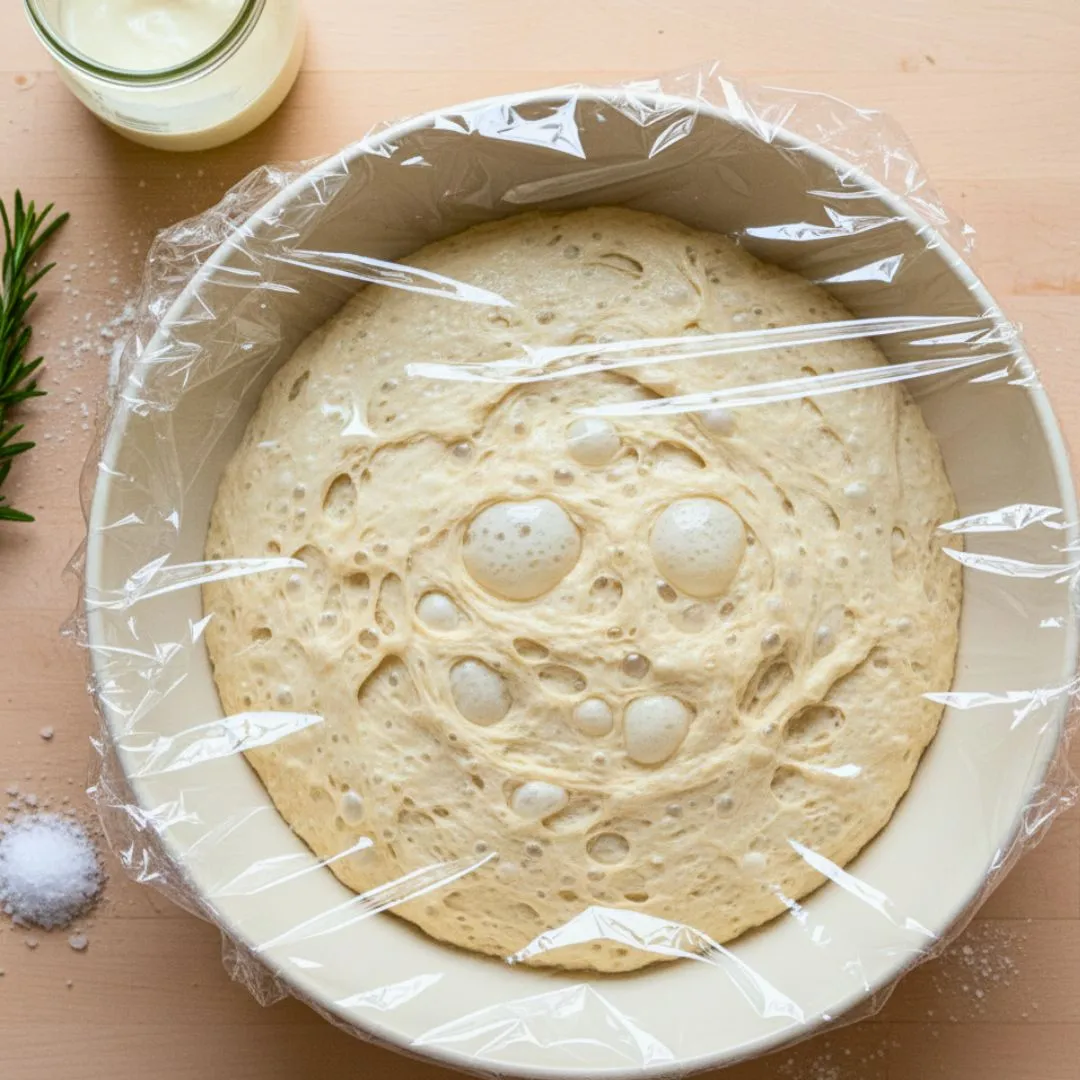
Bulk Fermentation (Overnight for Deep Flavor)
Cover the bowl and leave at room temperature for 12–18 hours (or 8–10 hours in a warm kitchen) until the dough is bubbly and slightly risen. This slow fermentation develops tangy, complex flavor—one of the hallmark benefits of sourdough fermentation.
If your starter is sluggish, feed it 4–6 hours before mixing to ensure a lively rise.

Prepare the Pan (Olive Oil is Key)
Coat a 9×13-inch (or similar) baking pan with 3–4 tbsp extra virgin olive oil. Transfer the fermented dough into the pan and gently coax it outward—avoid aggressively deflating the dough to preserve air pockets. The olive oil creates the classic, crispy underside and enhances the Mediterranean flavor profile.
Pro tip: Let the dough relax 10–15 minutes in the pan to make stretching easier without tearing.
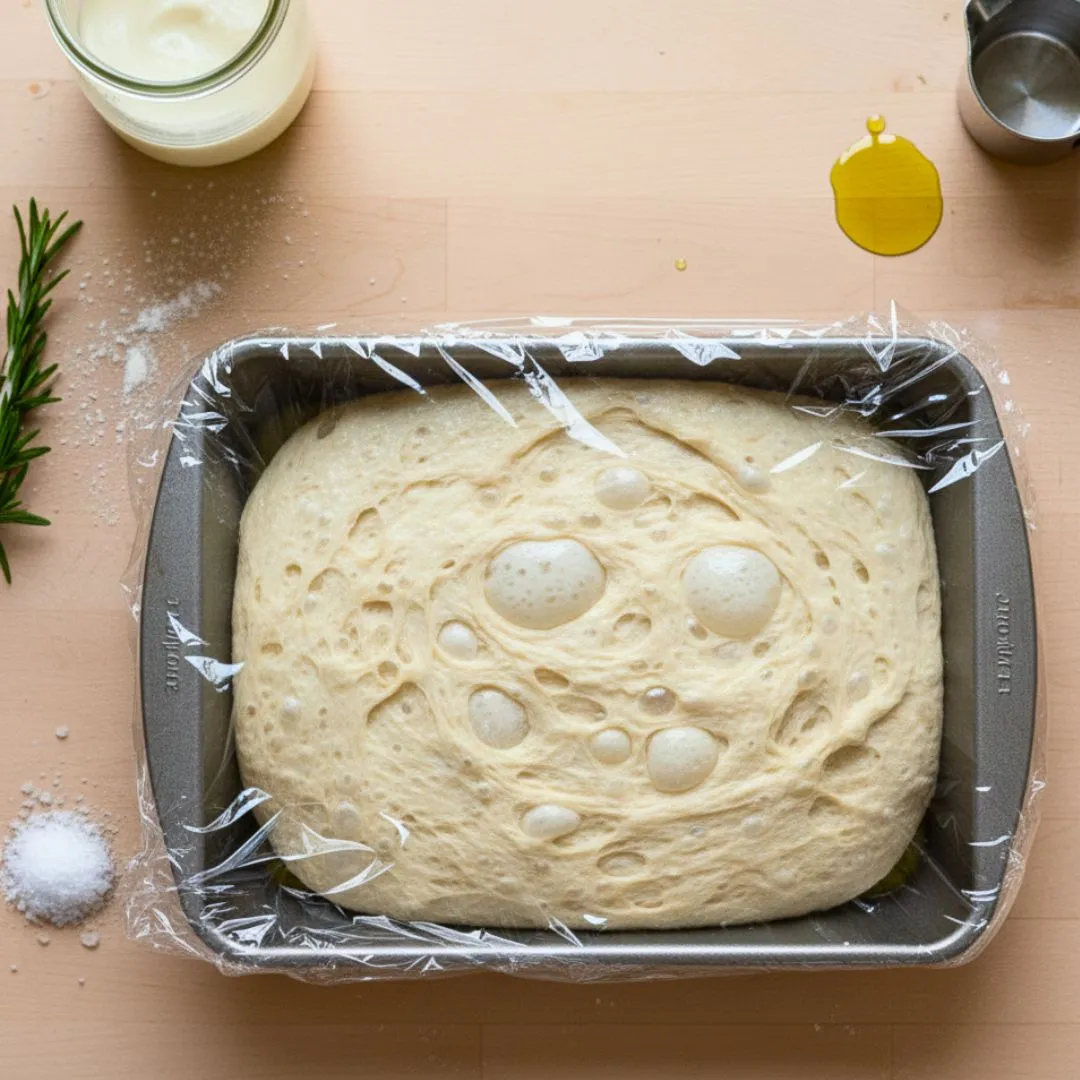
Second Proof (2–3 Hours for Puffy Dough)
Cover the pan loosely and let the dough proof for 2–3 hours at room temperature until noticeably puffy. This second rise is crucial for achieving the soft, airy interior and the classic focaccia oven spring.
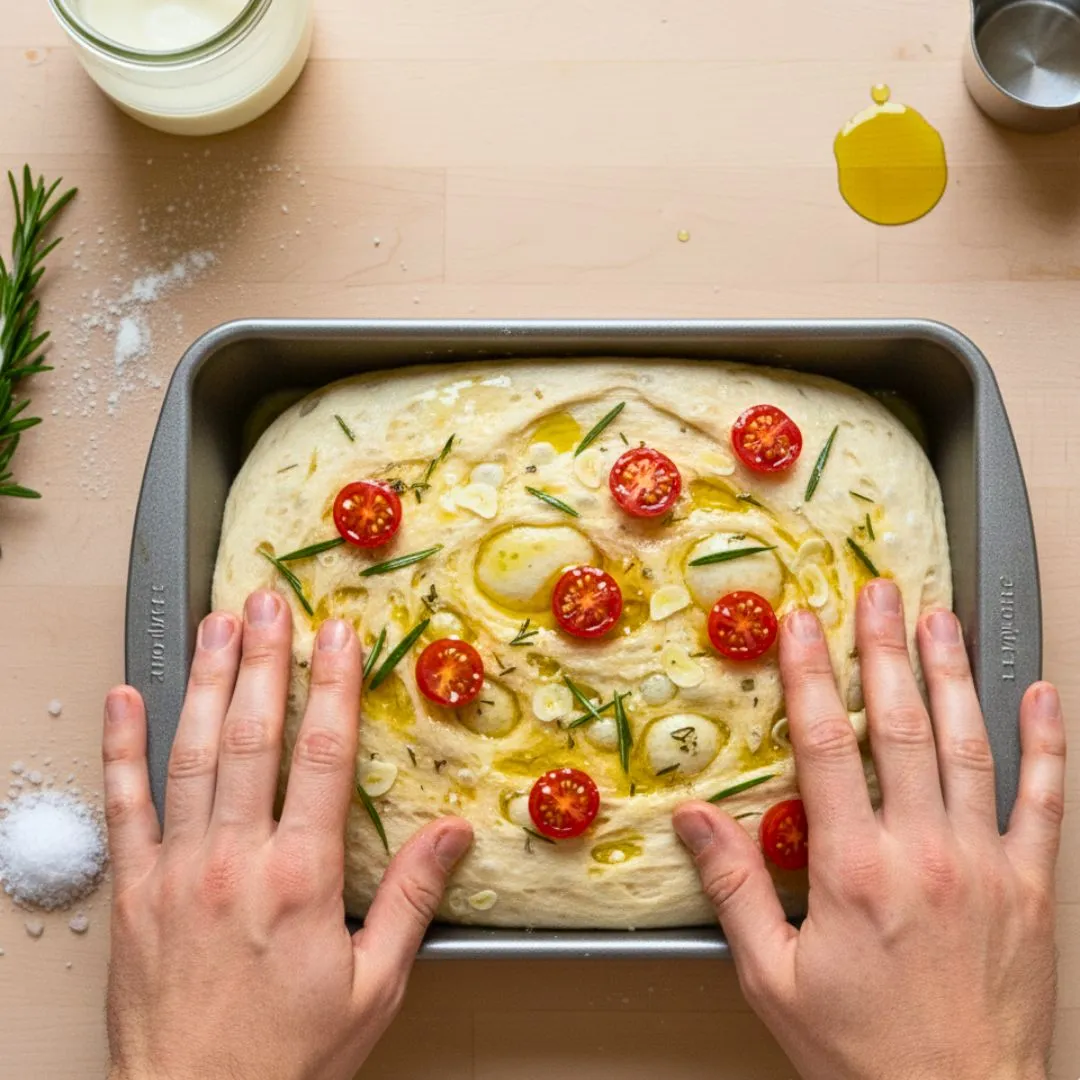
Dimple & Add Toppings
Drizzle the surface with an additional 2 tbsp olive oil. Use oiled fingertips to press deep, even dimples across the dough. Scatter toppings such as fresh rosemary, sliced garlic, cherry tomatoes, flaky sea salt or olives. The dimples hold olive oil and toppings—resulting in a golden, savory focaccia crust bursting with flavor.
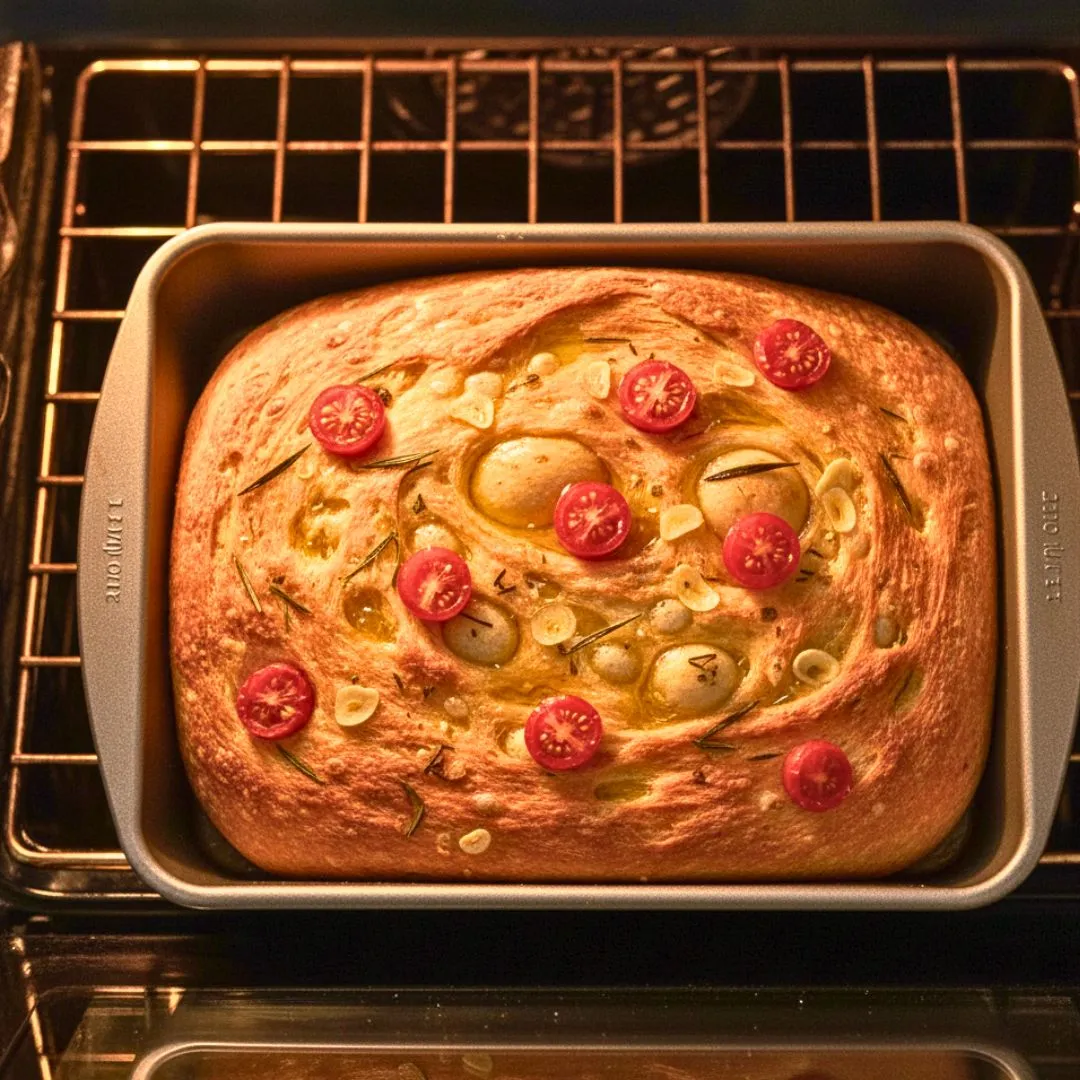
Bake to Perfection
Preheat your oven to 220°C / 430°F. Bake the focaccia for 22–25 minutes, or until the top is deep golden and the edges are crisp. The high heat encourages oven spring and creates that sought-after crisp crust while keeping the interior soft and airy.
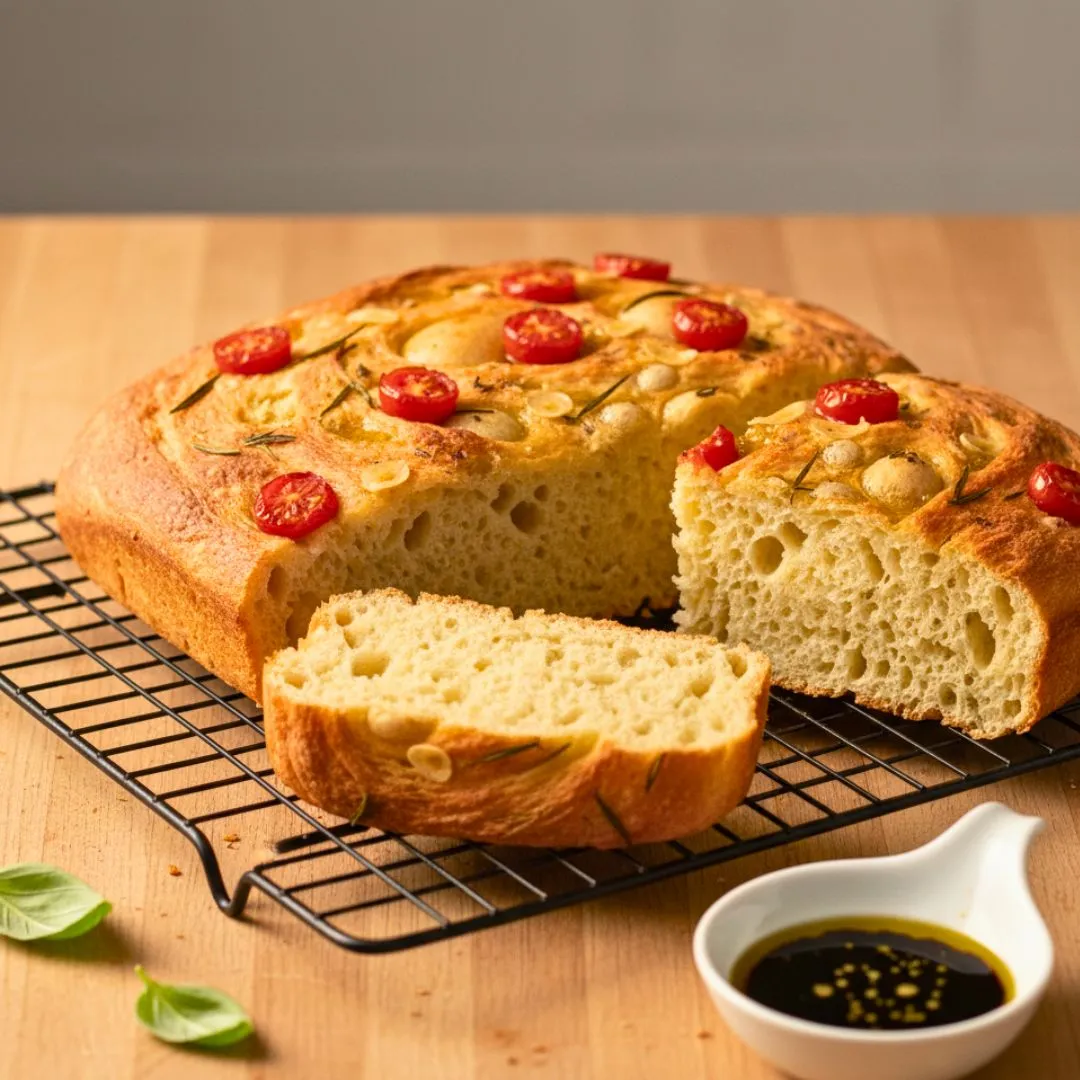
Rest, Slice & Serve
Remove focaccia from the oven and let it cool for at least 10 minutes on a wire rack to set the crumb. Slice into squares or wedges and serve warm with an olive oil & balsamic dip or use for sandwiches. Proper resting time ensures the airy structure stays intact and the flavor develops fully.
Serving idea: Top with finishing flaky sea salt and a drizzle of high-quality extra virgin olive oil for best flavor.
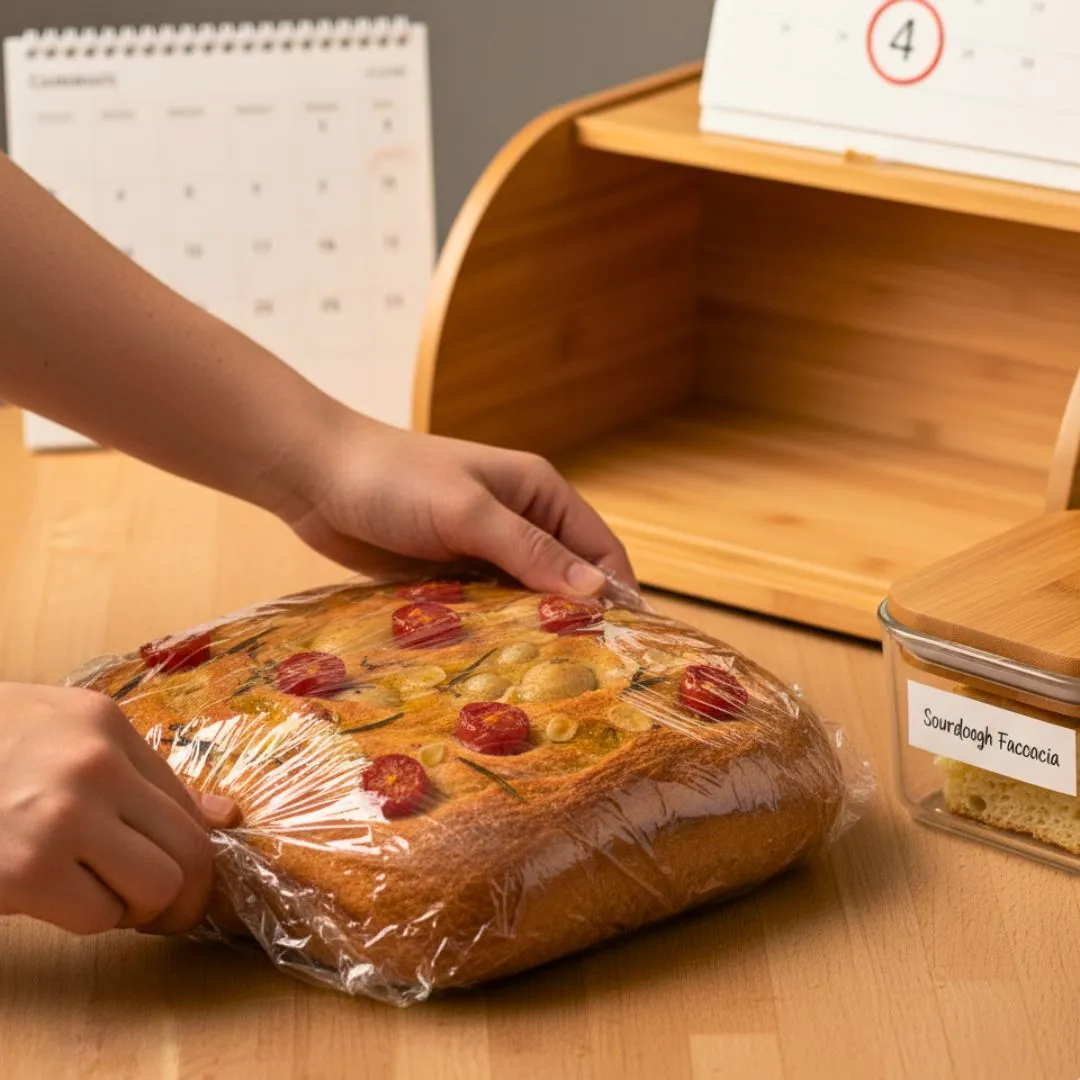
Storage & Reheating (Meal Prep Friendly)
Store focaccia at room temperature for 1–2 days in a bread box, in the refrigerator up to 4 days, or freeze up to 2 months (wrap tightly). To reheat, warm slices in a 180°C / 350°F oven for 5–7 minutes to revive crispness and aroma.
Note: For best texture after freezing, thaw overnight in the fridge and reheat in the oven.
Sourdough Focaccia Recipe Variations
Rosemary & Sea Salt No-Knead Focaccia
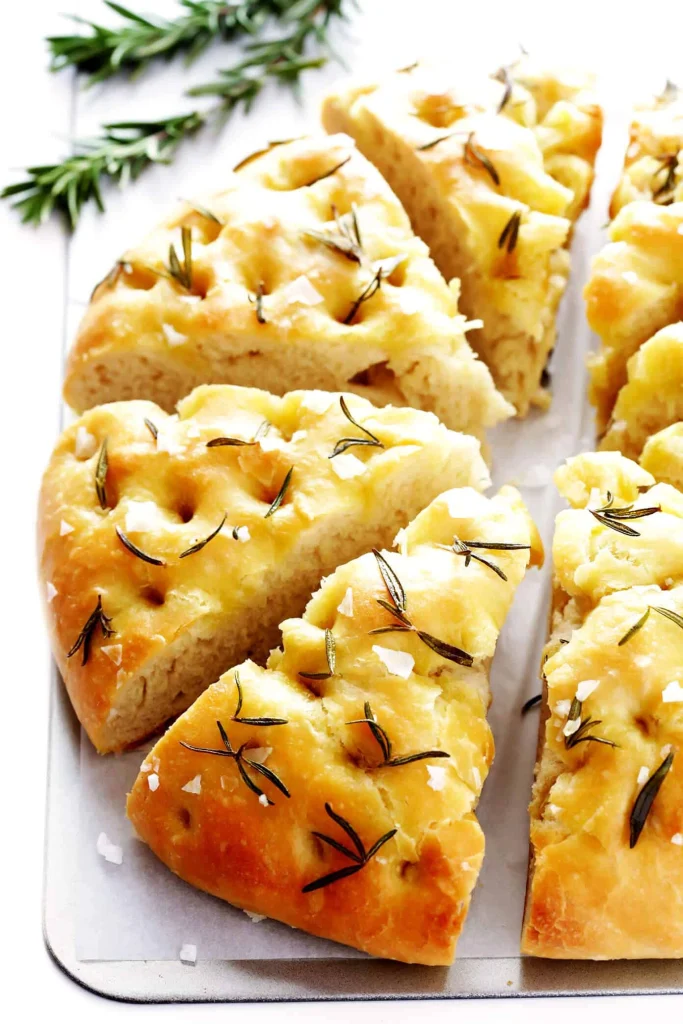
The classic Rosemary Sea Salt Focaccia is an SEO-friendly staple: simple ingredients, big flavor, and highly shareable photos. Use fresh rosemary and coarse flaky salt to achieve that bakery-style finish.
Tip: For the crispiest bottom, preheat your baking tray in the oven for 5 minutes and then transfer the dough.
Sourdough Garlic Focaccia (Roasted Garlic & Herb)
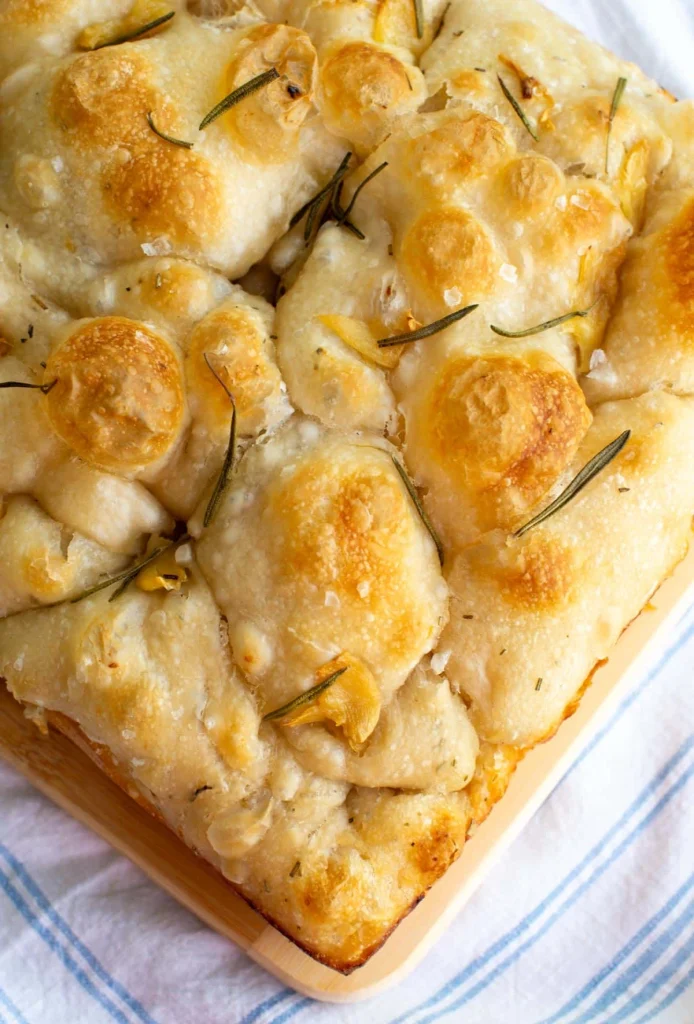
Garlic lovers will adore this version—roasted garlic brings a mellow, caramelized flavor while fresh herbs add brightness.
Tomato & Basil Focaccia (Caprese-Inspired)
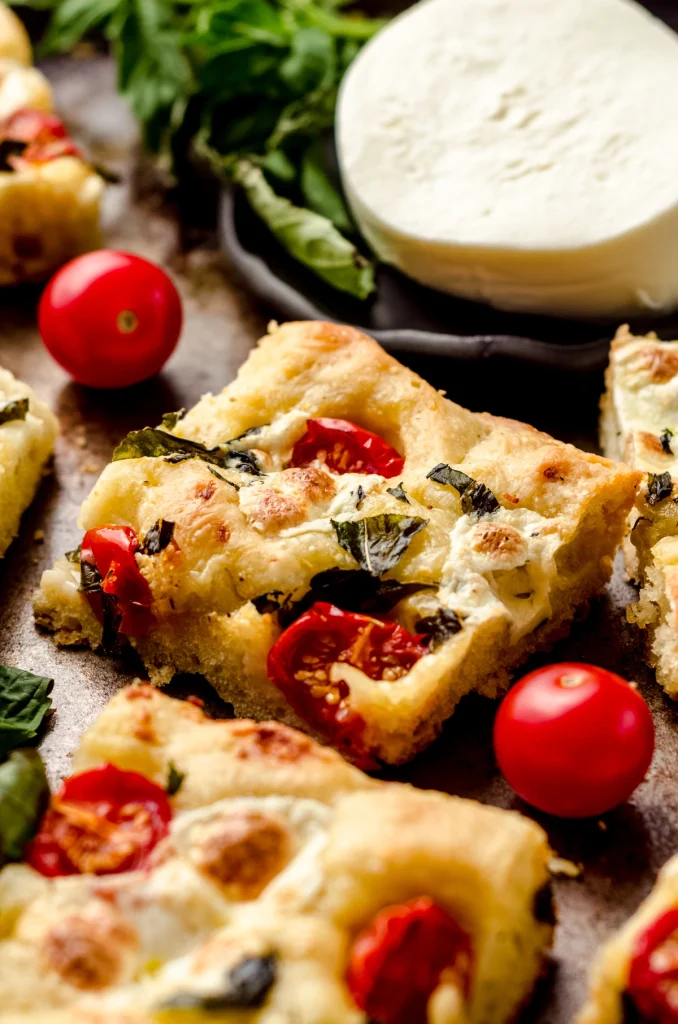
Bright, colorful, and highly clickable—this Tomato Basil Focaccia combines cherry tomatoes, fresh basil, and a scatter of Parmesan for a caprese-style focaccia variation perfect for a summer recipe.
Cheesy Sourdough Focaccia Recipe

A gooey, crowd-pleasing variant—think melted mozzarella, Parmigiano-Reggiano, or tangy feta.
Olive & Herb Focaccia (Mediterranean Style)
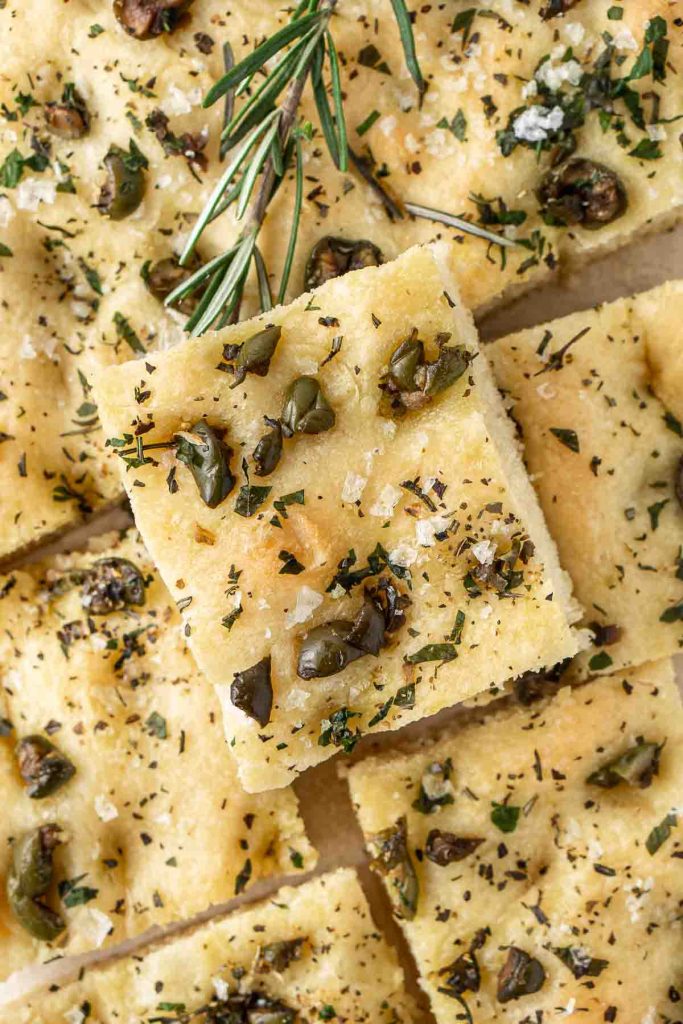
This Mediterranean-inspired focaccia features briny olives, oregano, and thyme for a bold flavor profile. Great for pairing with charcuterie boards and Mediterranean dinners.
Caramelized Onion & Thyme Focaccia
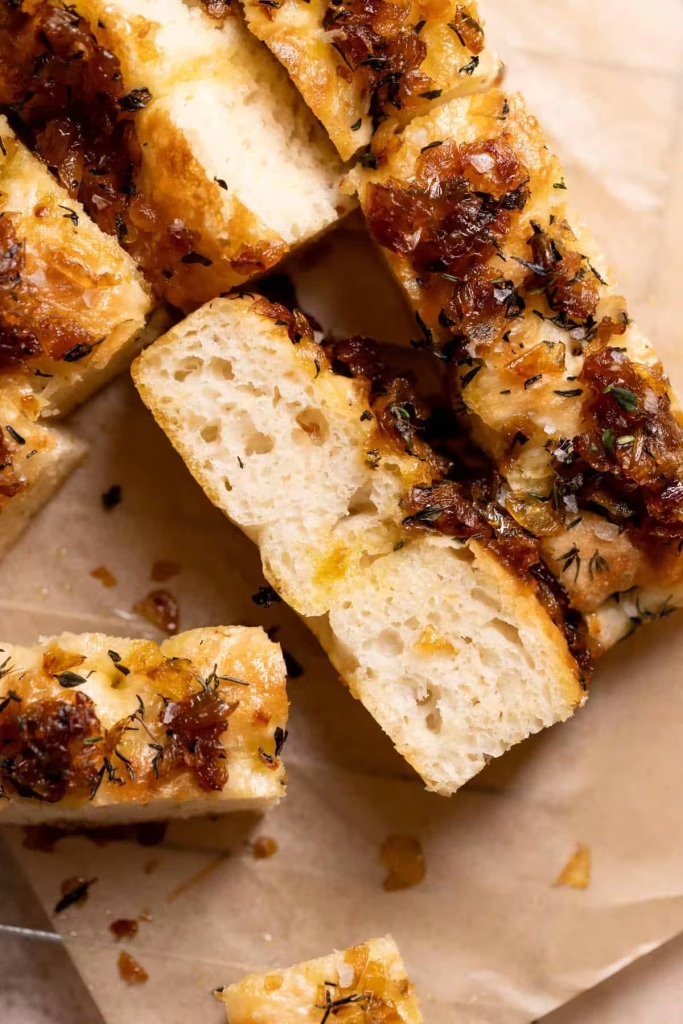
Sweetness from slow-cooked onions pairs beautifully with sourdough tang.
Sweet-Savory Focaccia (Fig, Honey & Prosciutto)
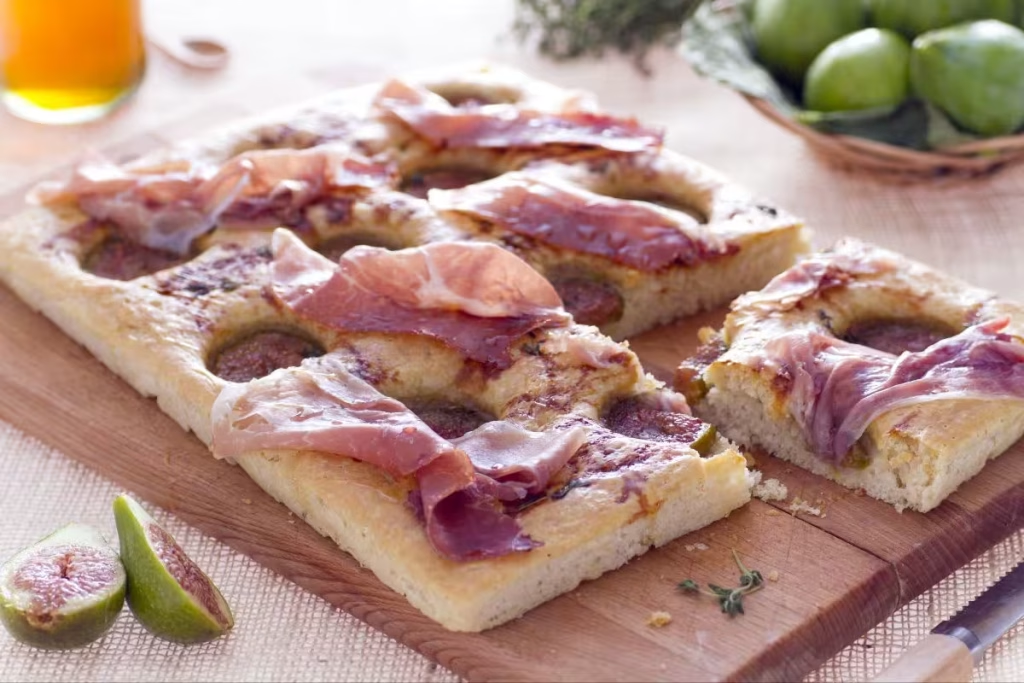
A trendy, viral-ready variant—combine dried figs or fresh figs with a drizzle of honey and slivers of prosciutto after baking for a complex sweet-savory flavor.
Toppings Ideas for Sourdough Focaccia Recipe
Turn your sourdough focaccia into a show-stopping centerpiece with these creative, restaurant-quality topping ideas. This Italian bread is my favorite among all breads.
Rosemary + Flaky Sea Salt (Classic)
The timeless rosemary sea salt focaccia. Drizzle with extra virgin olive oil, press fresh rosemary sprigs into the dimples, and finish with flaky sea salt for that bakery-style crust and aromatic, Mediterranean flavor.
Garlic Confit + Parmesan
For a rich, savory option, top focaccia with soft garlic confit, shards of aged Parmesan, and a sprinkle of parsley.
Cherry Tomato + Basil (Summer-Fresh)
Bright and colorful: scatter halved cherry tomatoes, torn basil, and a grating of Pecorino.
Caramelized Onion + Fresh Thyme
Deep, slightly sweet caramelized onions paired with fragrant thyme create a gourmet focaccia perfect for dinner parties.
Mediterranean Olives + Lemon Zest
A bright Mediterranean twist—briny olives, crunchy fennel fronds, and lemon zest balance the sourdough tang.
Pesto Swirl + Melting Cheese
Swirl vibrant basil pesto into the dough pockets, then top with mozzarella or fontina for a melty, visually arresting focaccia.
How to Serve Easy Sourdough Focaccia — Pairings, Drinks & Presentation
Dips & Condiments — Simple, Bold Flavors
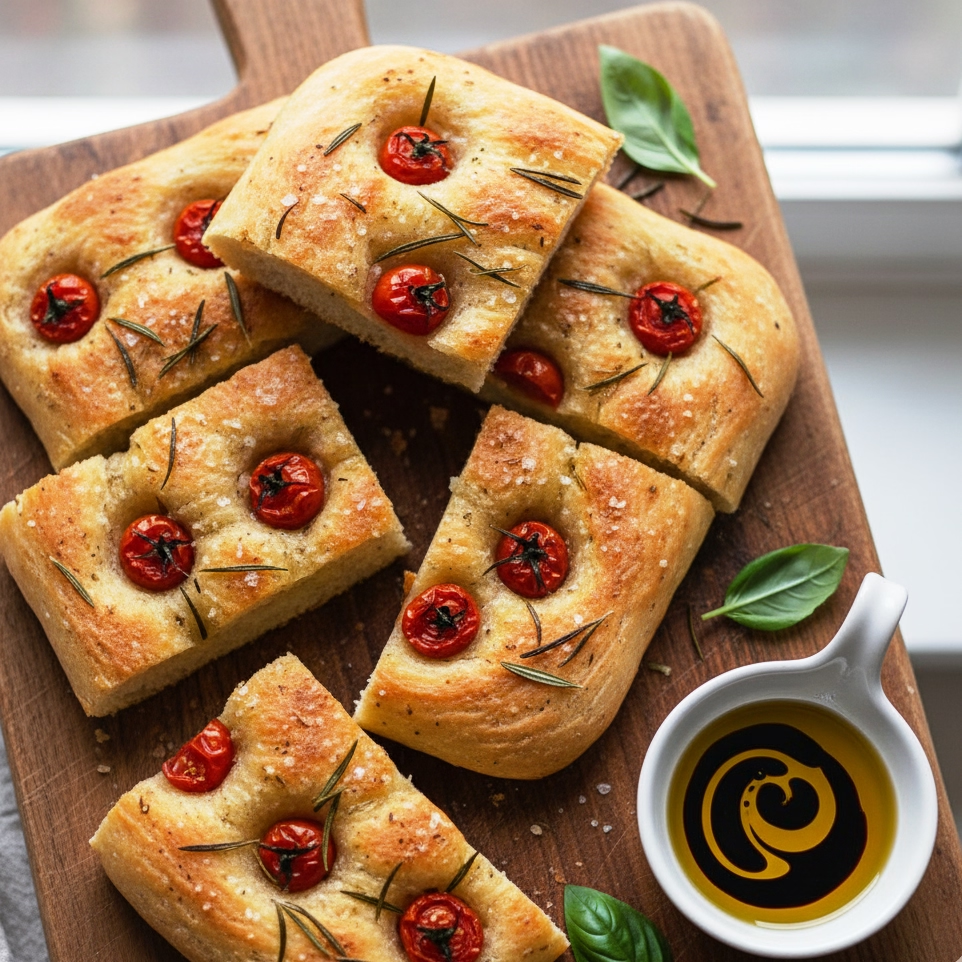
Keep a trio of dips on the table: extra virgin olive oil with aged balsamic, a bright lemon-herb vinaigrette and roasted garlic butter.
Soups & Salads — Balanced Comfort
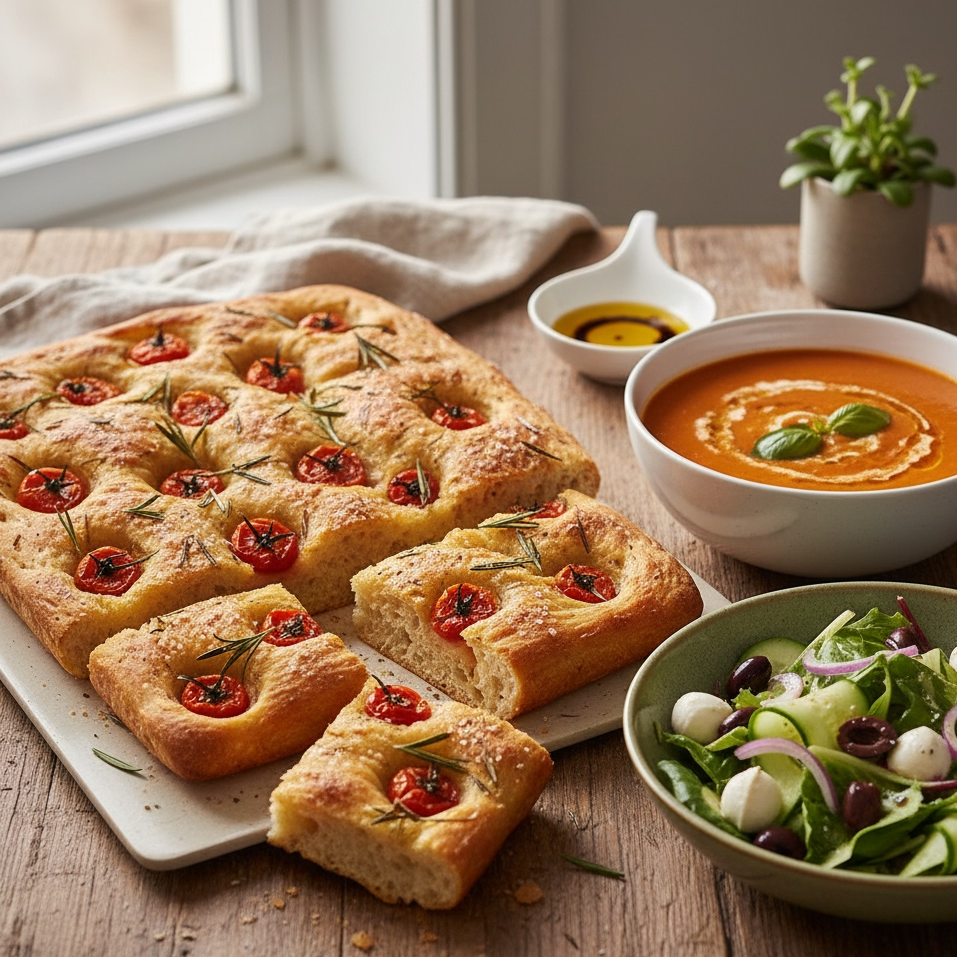
Match focaccia with tomato-based soups like tomato basil or hearty minestrone to contrast the bread’s olive oil richness. For lighter meals, pair with peppery arugula salads, citrus dressings, or shaved parmesan.
Sandwiches & Brunch
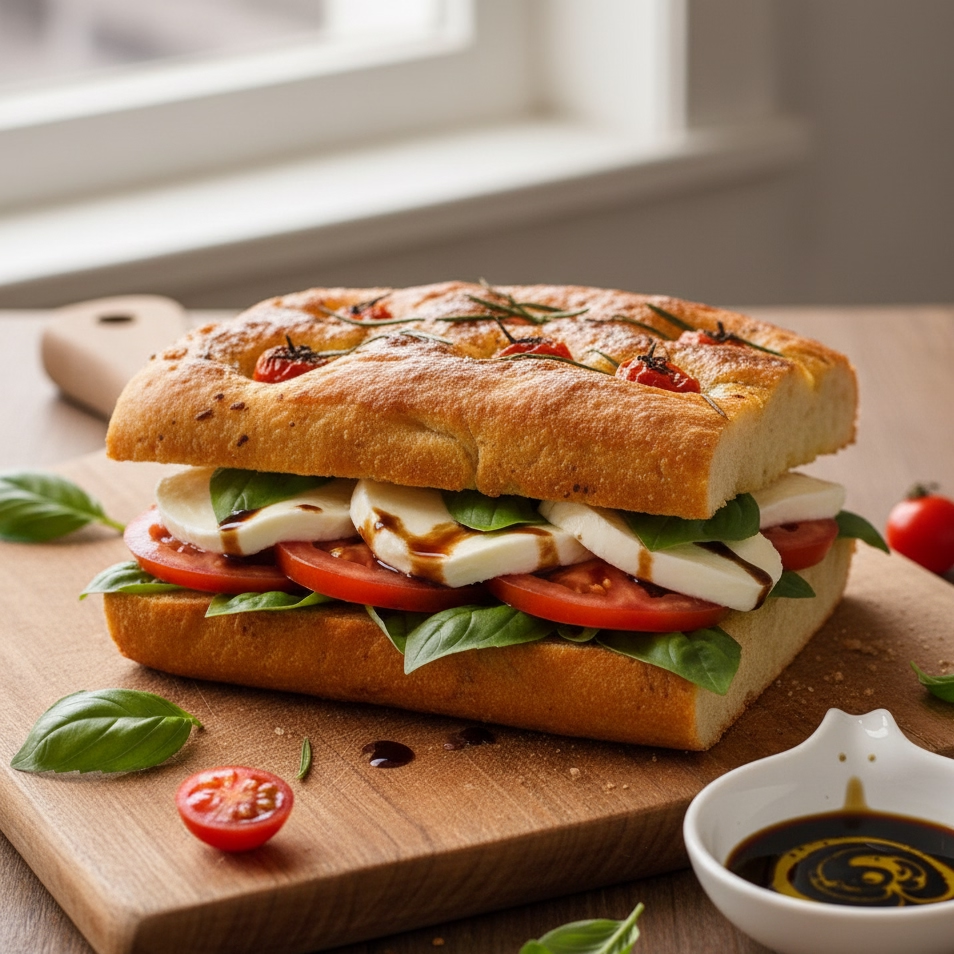
Use focaccia as a base for Caprese-style sandwiches, turkey & rosemary mayo paninis, or smoked salmon brunch plates.
Cheese Boards & Charcuterie

Add focaccia slices to a cheese board with burrata, prosciutto, and marinated olives.
Sourdough Focaccia Recipe FAQs
Yes, you can use discard, but for the lightest, most airy no-knead sourdough focaccia we recommend an active sourdough starter that is bubbly and recently fed. An active starter gives stronger fermentation, better oven spring, and a more open, irregular crumb typical of artisan bread.
Dense focaccia usually comes from one or more of these issues: under-active starter, low hydration, insufficient bulk fermentation, or over-handling the dough. For an airy focaccia with large holes, prioritize:
- Active starter (bubbly after feeding).
- High hydration (wet dough = better oven spring).
- Long, gentle fermentation (overnight or cold ferment for flavor and structure).
- Minimal degassing: handle gently when transferring to the pan and create dimples with fingertips without deflating too much.
Try cold fermenting in the fridge for 12–24 hours to develop flavor and a lighter crumb.
For a typical no-knead sourdough focaccia:
- Bulk fermentation: 8–18 hours at room temperature depending on starter strength and kitchen temperature (overnight is common).
- Second proof (in pan): 1.5–3 hours until puffy and jiggly.
If your kitchen is warm, shorten bulk fermentation. Alternatively, cold ferment in the fridge for 12–24 hours to slow fermentation and concentrate flavor — great for deeper, more complex sourdough notes.
Yes—all-purpose flour works and still yields tasty focaccia, but bread flour (higher protein) gives stronger gluten structure and a more open, chewy crumb. If you only have all-purpose, consider:
- Using slightly less water (to maintain workable hydration).
- Allowing a longer fermentation to develop gluten naturally.
Preheat your oven to 220°C / 425–450°F. Bake for about 22–28 minutes depending on the thickness of your focaccia and your oven’s true temperature. Look for a deep golden brown top and a crisp bottom. Allow the focaccia to rest on a cooling rack for 10–15 minutes before slicing to let the crumb set.
A hot tray or baking stone helps with bottom crisping; plenty of olive oil in the pan also contributes to that signature golden, slightly fried base.
Classic toppings include fresh rosemary, flaky sea salt, garlic, cherry tomatoes, olives, caramelized onions, and grated Parmesan. To keep toppings from sinking:
- Dimple the dough deeply with your fingertips to create pockets for oil and toppings.
- Drizzle extra virgin olive oil over the dough before adding toppings.
- Press toppings lightly into the dimples rather than piling them on.
- For watery toppings (like tomatoes), pat dry or halve and blot juices to avoid sogginess.
Storage tips for sourdough focaccia:
- Room temperature: Store loosely wrapped in parchment or a bread bag for 1–2 days.
- Refrigerator: Up to 4 days — but refrigeration can dry bread; reheat to regain texture.
- Freezer: Freeze slices or whole loaf wrapped tightly for up to 2 months. Thaw and reheat in a hot oven (180°C / 350°F) for 5–10 minutes to refresh.
Avoid plastic wrap directly on the crust for long storage; it softens the crust and reduces crispness.
Absolutely — cold fermentation in the refrigerator (12–48 hours) is a powerful tool. It slows yeast activity, allows enzymatic breakdown of starches, and produces deeper, tangier flavors and a more complex aroma. Cold fermenting also makes the dough easier to handle and can produce a more open crumb if you give it adequate time to warm before baking.
Focaccia and pizza dough share similar ingredients but differ in hydration, handling, and final texture. Focaccia typically has higher hydration, more olive oil, and is baked thicker with dimples and toppings. Pizza dough is usually stretched thin and baked at higher temps for a crisp bottom and slightly chewy crust. Both are beloved Italian breads, but focaccia is more bread-like and pillowy.
Gluten-free focaccia is possible, but it requires a specialized gluten-free sourdough starter and binding agents (xanthan gum, psyllium husk, or commercial blends) to mimic gluten’s structure. Expect a different texture — still delicious, but not the same airy crumb as wheat-based sourdough focaccia.
If you like this article about the Sourdough Focaccia Recipe | Mititei Recipe, please share it with your friends on Facebook and Pinterest. Also, subscribe to my blog to get all the latest content first on your mobile.

